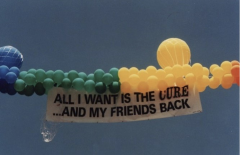Students as Partners Blog: Pascale LaRiviere
“While we see a pandemic rage throughout the world, and another epidemic on the rise, I’ve been fortunate to get the opportunity to spend time learning more about an older one. Over the past summer, I’ve been at work on the digital archive of the AIDS Activist History Project. My work there was for the benefit of my own personal development as a student of history and records, and for the benefit of students in FIST’s first year seminar course Introduction to LGBTQ Studies.
The archive, as part of the larger AIDS Activist History Project (AAHP), is central to one of the course’s assignments: editing a Wikipedia page about AIDS and AIDS activism in Canada using resources from the AAHP. The assignment requires synthesis of information gleaned from transcripts, but both Dr. Conrad (who teaches the course) and I felt that the visual nature of the digital archive would be beneficial to the students going forward. The archive is a wealth of information, from flyers for protests to scrapbook pages, from pins promoting safe sex to articles from independent gay and lesbian magazines. Though rich in content, the archive was difficult to navigate. My work involved tidying up the back-end of the archive: ameliorating the tagging system, amending metadata, and identifying issues to be addressed beyond my purview. My work has simplified navigation through this primary source materials and visual media for future students.

Though Introduction to LGBTQ Studies is not one focused solely on the North American HIV/AIDS epidemic of the 1980s and ‘90s, it underscores and informs most of the material of the course. I’ve found the time I’ve been able to spend immersed in ephemera from the Canadian activists’ response both deeply moving and an exercise in my ability to draw parallels between different periods of history. As a student of two interdisciplinary fields, Women’s and Gender Studies and Greek and Roman Studies, this type of synthesis is crucial to how I learn and work. The archive is a unique thing, too, in the types of information it contains. Learning how to work with sources outside of the typical academic paper, book, or literary work has been enlightening and will certainly inform how I approach evaluating and using sources. Dr. Conrad was also a tremendous mentor, guiding my work in the archive to help me find the most impact I could help make and teaching me how to examine these oral and visual histories.
The events of this summer, studying AIDS activism in Canada while a new epidemic in the queer community rages, and the valuable skills and perspective I gained from this work will certainly stick with me for a while.”
-Pascale LaRiviere